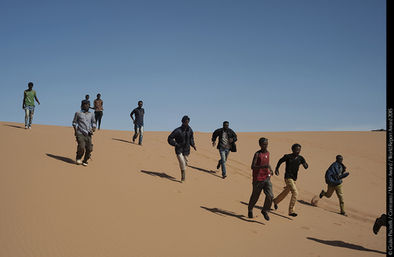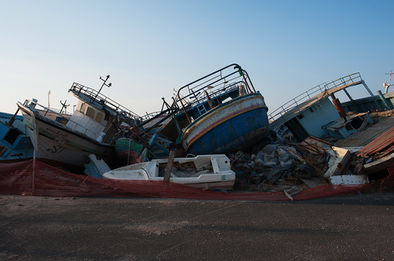FOTOTECA SIRACUSANA
PHOTOGALLERY - FOTOGRAFIA VINTAGE - BIBLIOTECA TEMATICA - CAMERA OSCURA B&W - DIDATTICA
SCRIPTPHOTOGRAPHY
Giulio PISCITELLI (IT)

GIULIO PISCITELLI
Il desiderio dell’Uomo di migliorare le proprie condizioni di vita non è ambizione che può essere fermata da muri e frontiere. Le migrazioni da un paese verso un altro esistono da che esiste l’Uomo stesso e dunque chiamare “esodo” i flussi che dall’Africa si dirigono verso l’Europa ha il sapore demagogico di una politica che solleva paure e steccati. Il Colonialismo non è mai terminato; a esso si è sostituito un Neocolonialismo che si impone sulle scelte politico-economiche di questo o tal altro paese africano, schiacciandolo sotto il macigno di un debito di difficile estinzione. La ricca Europa fa i conti con i guasti della sua politica estera e insieme con il fallace richiamo di una società capitalista che nemmeno al suo interno riesce a garantire condizioni di vita accettabili a tutti. “Ora questi”, si direbbe. Questi sono uomini, donne e bambini che lasciano ogni cosa – ammesso che abbiano qualcosa – per affermare il diritto cui si accennava nell’incipit: il diritto a una vita migliore. Noi scorgiamo solo il tratto finale del loro viaggio, l’approdo sulle nostre coste di gente affranta, provata, esausta; e costoro sono i più fortunati, perché migliaia e migliaia di quanti intendevano sbarcare ora giacciono in fondo al mare, dispersi per sempre, cibo per pesci. Poco sappiamo e poco vogliamo sapere – quasi a distogliere lo sguardo – del loro cammino verso il Paese in cui si imbarcheranno. Un cammino fatto di pericoli, di sabbie e stenti, di soprusi, di dignità lesa, di morte. Il giovane fotoreporter Giulio Piscitelli, come si conviene a un fotografo che vuol essere testimone dei grandi avvenimenti della società dell’Uomo, si addentra nel vivo dei “viaggi della speranza”. Ne fotografa le fatiche, le aspettative, i pericoli nelle rotte tra la Sicilia e le isole greche, in quel mare Mediterraneo ormai divenuto una bara liquida.
Nel 2011 il fotoreporter si imbarca in un porto tunisino insieme a un gruppo di migranti, su un barcone diretto in Italia. Ne nascerà il lavoro che apprezziamo: “From there to here”, titolo bellissimo e straniante. Noi non vediamo semplicemente un reportage, le immagini di Piscitelli ci costringono ad aprire gli occhi sul prezzo altissimo imposto dalla paura, a comprendere chi è un migrante, a vedere com’è fatta una vita spesa a nascondersi come prede braccate, e infine ostaggi dei crudeli scafisti prima di approdare in un Paese che nonostante gli sforzi umanitari nasconde frange di una durezza razzista che non vuole fare sconti. Vediamo dunque immagini di uomini e donne percorrere deserti, adunarsi speranzosi e tremanti, raccolti in preghiera, colti nella struggente nostalgia o nella consapevolezza di dover affidare ad altri la riuscita della propria vita. E poi cumuli di barconi in secca, vettori di una traversata sul pericolo giacere esausti come corpi morti. Un lavoro lungo e dovizioso, puntuale, che non manca di impressionarci e che ci conduce oltre l’esperienza dello sbarco, nei territori della cosiddetta “accoglienza”, tra i lavoratori extracomunitari delle campagne del Sud a pochi euro l’ora, dove prima ancora della schiena è la dignità a essere spezzata. Il lavoro di Giulio Piscitelli sgomenta perché ci restituisce in pieno una pagina che non conosciamo fino in fondo e che, di rimando, ci convince di non essere a conoscenza delle sensibilità di molti dei nostri connazionali, gli stessi che all’arrivo di piccoli gruppi di migranti nelle loro città innalzano proteste e barricate, offrendo loro solo la consapevolezza di essere giunti in una terra non meno pericolosa del mare.
Giuseppe Cicozzetti
da “From there to here”
foto di Giulio Piscitelli
Man's desire to improve his living conditions is not an ambition that can be stopped by walls and borders. The migrations from one country to another exist from which Man himself exists and therefore to call "exodus" the flows that go from Africa to Europe have the demagogic flavor of a policy that raises fears and fences.
Colonialism is never finished; it has been replaced by a Neocolonialism that imposes itself on the political-economic choices of this or other African country, crushing it under the boulder of a debt of difficult extinction. The rich Europe is confronted with the failures of its foreign policy and along with the fallacious appeal of a capitalist society that even within it can ensure conditions of life acceptable to anyone.
"Now these", one would say. These are men, women and children who leave everything - if they have something - to affirm the right mentioned in the incipit: the right to a better life. We only see the final stretch of their journey, the landing on our coasts of frank, tested, exhausted people; and these are the lucky ones, because thousands and thousands of those who intended to land now lie at the bottom of the sea, dispersed forever, food for fishes.
Little do we know and little we want to know - almost to look away - of their journey to the country in which they will embark. A journey made of dangers, sands and hardships, of abuses, of injured dignity, of death. The young photojournalist Giulio Piscitelli, as befits a photographer who wants to be a witness to the great events of the society of Man, goes into the heart of the "journeys of hope". He photographs the hardships, the expectations, the dangers in the routes between Sicily and the Greek islands, in that Mediterranean sea that has now become a liquid coffin.
In 2011 the photojournalist embarked on a Tunisian port together with a group of migrants, on a boat heading to Italy. The work we appreciate will be born: "From there to here", a beautiful and alienating title. We do not simply see a reportage, the images of Piscitelli force us to open our eyes to the very high price imposed by fear, to understand who is a migrant, to see how a life is spent hiding as prey hunted, and finally hostages of cruel smugglers before landing in a country that despite humanitarian efforts hides fringes of a racist hardness that does not want to make discounts.
So we see images of men and women walking deserts, gathering hopeful and trembling, gathered in prayer, caught in the longing of nostalgia or in the awareness of having to entrust the success of their lives to others. And then heaps of barges in dry, vectors of a crossing on the danger to lie exhausted like dead bodies.
A long and dovish job, punctual, that does not fail to impress us and that leads us beyond the experience of the landing, in the territories of the so-called "reception", among non-EU workers in the Southern countryside at just a few euro an hour, where before of the back is their dignity to be broken.
The work of Giulio Piscitelli dismayed because it gives us back a full page that we do not know until the end and that, in return, convinces us not to be aware of the sensibilities of many of our countrymen, the same as the arrival of small groups of migrants in their cities raise protests and barricades, offering them only the awareness of having reached a land no less dangerous than the sea.
Giuseppe Cicozzetti
from “From there to here”
ph. Giulio Piscitelli











